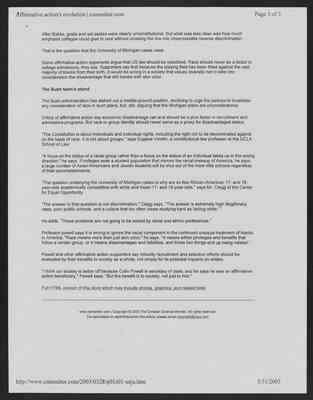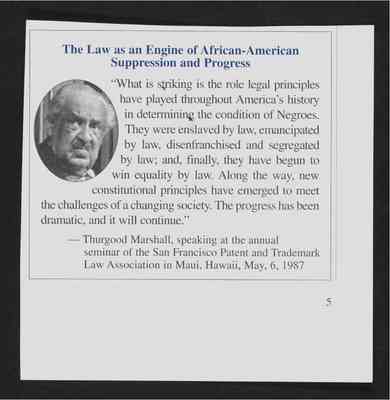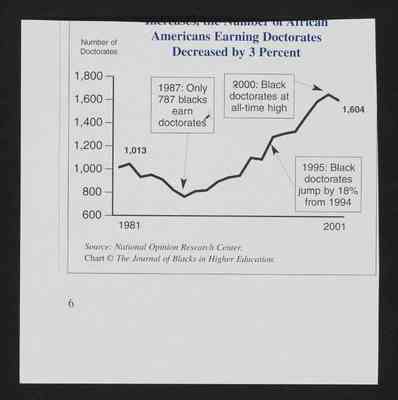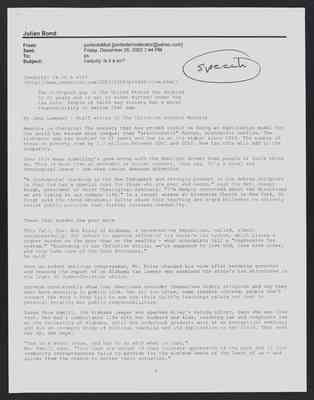Pages
6
Affirmative action's evolution │csmonitor.com Page 3 of 3
After Bakke, goals and set-asides were clearly unconstitutional. But what was less clear was how much emphasis colleges could give to race without crossing the line into impermissible reverse discrimination.
That is the question that the University of Michigan cases raise.
Some affirmative-action opponents argue that the US law should be colorblind. Race should never be a factor in college admissions, they say. Supporters say that because the playing field has been tilted against the vast majority of blacks from their birth, it would be wrong in a society that values diversity not to take into consideration the disadvantage that still travels with skin color.
The Bush team's stand
The Bush administration has staked out a middle-ground position, declining to urge the justices to invalidate any consideration of race in such plans, but, still, arguing that the Michigan plans are unconstitutional.
Critics of affirmative action say economic disadvantage can and should be a plus factor in recruitment and admissions programs. But race or group identity should never serve as a proxy for disadvantaged status.
"The Constitution is about individuals and individual rights, including the right not to be discriminated against on the basis of race. It is not about groups," says Eugene Volokh, a constitutional law professor at the UCLA School of Law.
"A focus on the status of a racial group rather than a focus on the status of an individual takes us in the wrong direction," he says. "If colleges seek a student population that mirrors the racial makeup of America, he says, a large number of Asian-Americans and Jewish students will be shut out of the most elite schools regardless of their accomplishments.
"The question underlying the University of Michigan cases is why are so few African-American 17- and 18-year-olds academically competitive with white and Asian 17- and 18-year-olds," syad Mr. Clegg of the Center for Equal Opportunity.
"The answer to that question is not discrimination," Clegg says. "The answer is extremely high illegitimacy rates, poor public schools, and a culture that too often views studying hard as 'acting white.'"
He adds, "Those problems are not going to be solved by racial and ethnic preferences."
Professor powell says it is wrong to ignore the racial component in the continued unequal treatment of blacks in America. "Race means more than just skin color," he says. "It means either privileges and benefits that follow a certain group, or it means disadvantages and liabilities, and those two things end up being related."
Powell and other affirmative-action supporters say minority recruitment and selection efforts should be evaluated by their benefits to society as a whole, not simply for its potential impacts on whites.
"I think our society is better off because Colin Powell is secretary of state, and he says he was an affirmative-action beneficiary," Powell says. "But the benefit is to society, not just to him."
Full HTML version of this story which may include photos, graphics and related links
---------------------------------------------------------------------------------------------
www.csmonitor.com│Copyright © 2003 The Christian Science Monitor. All rights reserved.
For permission to reprint/republish this article, please email copyright@csps.com
http://www.csmonitor.com/2003/0328/p01s01-usju.htm 3/31/2003
7
The Law as an Engine of African-American Suppression and Progress
"What is striking is the role legal principles have played throughout America's history in determining the condition of Negroes. They were enslaved by law, emancipated by law, disenfranchised and segregated by law; and, finally, they have begun to win equality by law. Along the way, new constitutional principles have emerged to meet the challenges of a changing society. The progress has been dramatic, and it will continue."
- Thurgood Marshall, speaking at the annual seminar of the San Francisco Patent and Trademark Law Association in Maui, Hawaii, May, 6, 1987
8
[chart] [text cut off] Number of African Americans Earning Doctorates Decreased by 3 Percent
1987: Only 787 blacks earn doctorates.
2000: Black doctorates at all-time high
1995: Black doctoratges jump by 18% from 1994
Source: National Opinion Research Center. Chart copyright The Journal of Blacks in Higher Education
9
[email] Page 1 of 1
Julian Bond--Washington
From: "Shawna Bishop" To: julian_bond@msn.com Sent: Thursday, April 17, 2003 122:03 PM
JB:
Hope all is well.
I just wanted to let you know that my aunt Nita's fiance passed away last week. (I know the two of you work together on Volve's diversity board and thought you may want to know)
Shawna
Have a Happy Easter.
____________________________________________________________________ Upgrade Outlook® - Add icons ☺to your Emails Click here
10
Julian Bond
From: portsideMod [portsidemoderator@yahoo.com] Sent: Friday, December 26, 2003 7:44 PM To: ps Subject: Inequity: Is it a sin?
[Circled written text]: speech
Inequity: Is it a sin? http://www.csmonitor.com/2003/1224/p14s03-lire.html
The rich-poor gap in the United States has doubled in 21 years and is set to widen further under new tax cuts. People of faith say society has a moral responsibility to narrow the gap.
By Jane Lampman - Staff writer of The Christian Science Monitor
America is changing: The society that has prided itself on being an egalitarian model for the world has become more unequal than "aristocratic" Europe, economists confirm. The rich-poor gap has doubled in 21 years and now is at its widest since 1929. The number of those in poverty rose by 1.7 million between 2001 and 2002. New tax cuts will add to the disparity.
Does this mean something's gone wrong with the American dream? Some people of faith think so. This is more than an economic or social concern, they say. It's a moral and theological issue - one they insist demands attention.
"A fundamental teaching in the New Testament and strongly present in the Hebrew scripture is that God has a special care for those who are poor and needy," says the Rev. Joseph Hough, president of Union Theological Seminary. "I'm deeply concerned about the directions we are taking in our common life." In a recent sermon at Riverside Church in New York, Dr. Hough said the three Abrahamic faiths share this teaching and urged believers to actively resist public policies that further increase inequality.
Taxes that burden the poor more
This fall, Gov. Bob Riley of Alabama, a conservative Republican, called, albeit unsuccessfully, for voters to approve reform of his state's tax system, which places a higher burden on the poor than on the wealthy - what economists call a "regressive tax system." "According to our Christian ethics, we're supposed to love God, love each other, and help take care of the less fortunate", he said.
Once an ardent anti-tax congressman, Mr. Riley changed his view after becoming governor and reading the report of an Alabama tax lawyer who examined the state's tax structures in the light of Judeo-Christian ethics.
Surveys consistently show that Americans consider themselves highly religious and say they want more morality in public life. Yet all too often, some leaders contend, people don't connect the dots - they fail to see how their faith's teachings relate not just to personal morality but public responsibilities.
Susan Pace Hamill, the Alabama lawyer who sparked Riley's reform effort, says she was like that. She had a comfortable life with her husband and kids, teaching tax and corporate law at the University of Alabama, until she undertook graduate work at an evangelical seminary and did an in-depth study of biblical teaching and its application to her field. That woke her up, she says.
"Tax is a moral issue, and has to do with what is just," Ms. Hamill adds. "Your laws are unjust if they tolerate oppression of the poor and if your community infrastructure fails to provide for the minimum needs of the least of us - and allows them the chance to better their situation."
1




